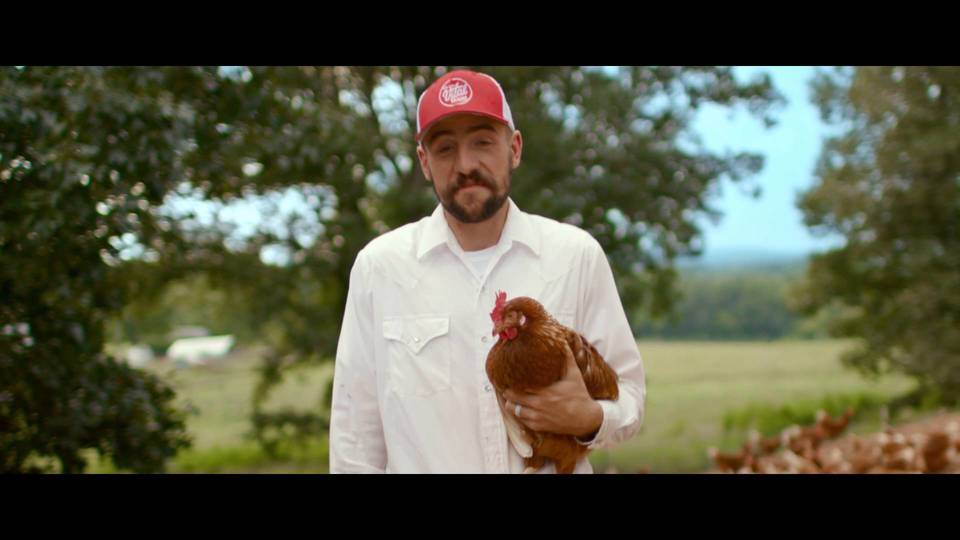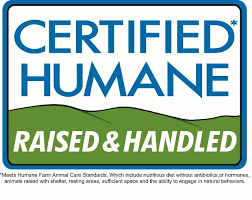This Ad Calls “Bullsh*t” on Cage-Free Eggs, So Let’s Talk About Egg Labeling
Labeling is insanely complicated. This needs to change.
This Ad Calls “Bullsh*t” on Cage-Free Eggs, So Let’s Talk About Egg Labeling
Labeling is insanely complicated. This needs to change.

In the ad, Stuart Dill, an actual farmer who raises eggs for Vital Farms, calls out some of the same fake labeling nonsense that we here at Modern Farmer have been railing against for years. The phrase “cage-free” appears commonly on eggs, but, as Dill (and, by extension, Vital Farms) points out, it is, well, bullshit.
“There is a significant portion of the consumer base, about 92 percent, who have a very poor understanding of the realities of cage-free,” says Dan Brooks, the creative director at Vital Farms. He’s right; various surveys have shown that consumers do not really understand what “cage-free” means, which is understandable, because it doesn’t actually mean anything.
Total Bullshit?
Cage-free is one of a pantheon of terms, like “natural” and “free range,” that, on its own, has no legal definition and no agency making sure that those using it adhere to any particular standard. It is meaningless; literally any company can just write “cage-free” on their egg carton.
But here’s the thing: “pasture-raised” is also equally vague. And this ad – which is very fun – repeatedly states that Vital Farms’ hens are “pasture-raised,” meaning that their lives do actually conform to the general understanding of what you’d imagine a cage-free life is like: wandering through grass, pecking at insects, flapping wings in the open air. Yes, it happens to be true in the case of Vital Farms (more on that in a bit), but like “cage free,” “pasture-raised” labeling is not regulated; by itself, the term has no meaning whatsoever.
So When Are These Terms Meaningful?
The key thing to understand here is the presence of an auditing agency. These agencies loosely include the government-backed National Organic Program, as well as private agencies like Humane Farm Animal Care and the Rainforest Alliance. Those private agencies charge a small fee to come in and inspect farms to see if things are up to their standards. In terms of eggs, they’re looking at the animals’ access to the outdoors, sunlight, space to move, and more. If the farm passes their inspection, they’re allowed to use the agency’s emblem on their packaging.

The Humane Farm Animal Care agency’s minimum standards – if you follow those, you can use the emblem – are not thrilling, according to Consumer Reports research. But that’s not the end of the story; this particular agency has different levels of strictness, which are indicated by other phrases on the packaging. A Certified Humane label sets a baseline, but not a ceiling.
In order to get the emblem and be allowed to write “pasture-raised” on your label, a company must meet some pretty intense standards – more intense even than organic certification. They’re among the best egg standards on the market. The presence of both the badge and the phrase means, basically, that this farm has met the highest standards of this agency. And Vital Farms has that! Very good!
Back To The Ad…
There is an issue here, which, to be honest, is not the fault of Vital Farms; it is an essential problem with the hodgepodge world of food labeling.
This video doesn’t mention certification at all. If a consumer sees this ad, there’s the possibility that the takeaway could be “pasture-raised is good, cage-free is bad,” which is not the case. The truth is, “cage-free is bad, but pasture-raised plus a little emblem that reads ‘Certified Humane Raised and Handled’ is good.” This is complicated, we know. And Vital knows it too; when I brought it up, Brooks was fully aware of the issue.
“That’s a very valid point,” he said. “From a simple communications perspective, in the context of what we’re trying to convey through the video, we wanted to keep the consumer focused on who we are and what we do.” Basically, his company’s job is not to make activist educational films; it’s to sell eggs. The labeling situation is brutally confusing for a short ad – or even for a longer blog post! – and Vital Farms does, to its credit, explain things well on its website. “This is the first video in an ongoing set of videos that addresses this issue, so it may be that a future video introduces the concept of auditing and what that means,” Brooks said.
So! We applaud Vital Farms for getting out the word on fake labeling. But it’s important to get out the word on the full story of real labeling, too – even when it’s maddeningly confusing. Consumers should not be required to know the full background of any of a dozen emblems, and whether the presence of other phrases alongside those emblems indicates anything, and what exactly that means. It’s all insane and awful. And yes: “cage-free” is bullshit.
Follow us
This work is licensed under a Creative Commons Attribution-NoDerivatives 4.0 International License.
Want to republish a Modern Farmer story?
We are happy for Modern Farmer stories to be shared, and encourage you to republish our articles for your audience. When doing so, we ask that you follow these guidelines:
Please credit us and our writers
For the author byline, please use “Author Name, Modern Farmer.” At the top of our stories, if on the web, please include this text and link: “This story was originally published by Modern Farmer.”
Please make sure to include a link back to either our home page or the article URL.
At the bottom of the story, please include the following text:
“Modern Farmer is a nonprofit initiative dedicated to raising awareness and catalyzing action at the intersection of food, agriculture, and society. Read more at <link>Modern Farmer</link>.”
Use our widget
We’d like to be able to track our stories, so we ask that if you republish our content, you do so using our widget (located on the left hand side of the article). The HTML code has a built-in tracker that tells us the data and domain where the story was published, as well as view counts.
Check the image requirements
It’s your responsibility to confirm you're licensed to republish images in our articles. Some images, such as those from commercial providers, don't allow their images to be republished without permission or payment. Copyright terms are generally listed in the image caption and attribution. You are welcome to omit our images or substitute with your own. Charts and interactive graphics follow the same rules.
Don’t change too much. Or, ask us first.
Articles must be republished in their entirety. It’s okay to change references to time (“today” to “yesterday”) or location (“Iowa City, IA” to “here”). But please keep everything else the same.
If you feel strongly that a more material edit needs to be made, get in touch with us at [email protected]. We’re happy to discuss it with the original author, but we must have prior approval for changes before publication.
Special cases
Extracts. You may run the first few lines or paragraphs of the article and then say: “Read the full article at Modern Farmer” with a link back to the original article.
Quotes. You may quote authors provided you include a link back to the article URL.
Translations. These require writer approval. To inquire about translation of a Modern Farmer article, contact us at [email protected]
Signed consent / copyright release forms. These are not required, provided you are following these guidelines.
Print. Articles can be republished in print under these same rules, with the exception that you do not need to include the links.
Tag us
When sharing the story on social media, please tag us using the following: - Twitter (@ModFarm) - Facebook (@ModernFarmerMedia) - Instagram (@modfarm)
Use our content respectfully
Modern Farmer is a nonprofit and as such we share our content for free and in good faith in order to reach new audiences. Respectfully,
No selling ads against our stories. It’s okay to put our stories on pages with ads.
Don’t republish our material wholesale, or automatically; you need to select stories to be republished individually.
You have no rights to sell, license, syndicate, or otherwise represent yourself as the authorized owner of our material to any third parties. This means that you cannot actively publish or submit our work for syndication to third party platforms or apps like Apple News or Google News. We understand that publishers cannot fully control when certain third parties automatically summarize or crawl content from publishers’ own sites.
Keep in touch
We want to hear from you if you love Modern Farmer content, have a collaboration idea, or anything else to share. As a nonprofit outlet, we work in service of our community and are always open to comments, feedback, and ideas. Contact us at [email protected].by Dan Nosowitz, Modern Farmer
September 25, 2017
Modern Farmer Weekly
Solutions Hub
Innovations, ideas and inspiration. Actionable solutions for a resilient food system.
ExploreExplore other topics
Share With Us
We want to hear from Modern Farmer readers who have thoughtful commentary, actionable solutions, or helpful ideas to share.
SubmitNecessary cookies are absolutely essential for the website to function properly. This category only includes cookies that ensures basic functionalities and security features of the website. These cookies do not store any personal information.
Any cookies that may not be particularly necessary for the website to function and are used specifically to collect user personal data via analytics, ads, other embedded contents are termed as non-necessary cookies.
Im an pastured Farmer. APPPA and other organazations are far ahead of the curve. I could spend hours on why certified humane is just another expense someone who really does sell high quality eggscant afford. Visit the Farm thats the only way you really can know. Personally if your organic thats a crap label with over 10,000 approved chemicals ans should be looked upon very skeptically..
What do they do with all of the unwanted Male chicks?
My main concern is: Are the hens treated humanly and do they have a good life? What happens when the hens no longer lay eggs?
What is the difference between pasture raised, and pasture raised organic? The organic have lighter yolks! I asked Vital Farms that question and got no reply.
Pasture raised is great but without being organic they can supplement their food with anything they want to make them grow fast and without disease which is not “natural” and could be downright harmful to humans.
Thank you!